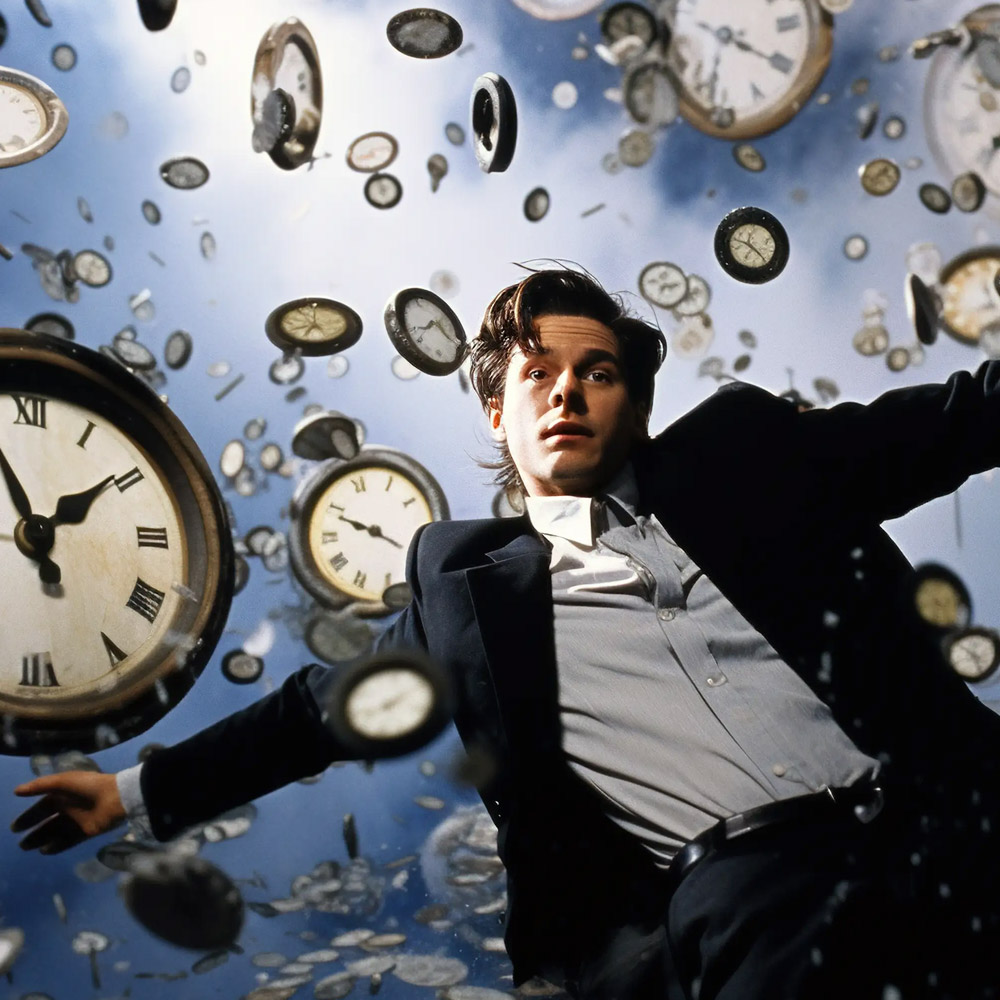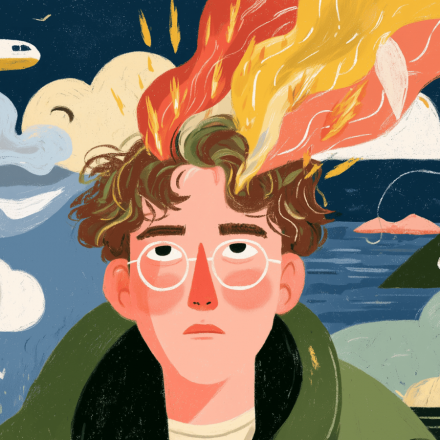We live fast—too fast. And the number of unfinished tasks grows like a snowball.
We suggest trying 10 ways to deal with the perpetual time crunch and stress.
"I've been staring at my iPhone for the third hour straight. I have six chats open on WhatsApp, a couple more on Facebook, plus several emails and SMS messages in parallel. Of course, I'm in a rush and trying to type all these messages as quickly as possible, jumping from one to another, switching back and forth between windows. Don't think I'm complaining—on the contrary. I enjoy all this. The feeling of being needed, of my own (illusory) efficiency, of new ideas, and the hope that just a bit more, and I'll get everything done. But, alas, that's not the case. In reality, I'm not getting ANYTHING done. I can't remember the last time I left work or went to bed with the feeling that I had done at least half of what was needed. This applies to both small daily tasks and global plans. I’m an addict. An information addict. Dependency on information that plunges us into a constant state of urgency due to our decreasing ability to concentrate and finish what we started is the diagnosis for most people living in the post-industrial age."
This is what the renowned English psychologist and business coach Tony Crabbe writes about in his bestseller How to Escape the Whirlwind of Endless Tasks:
"We live in a world of fragmentation and distraction. Fragments of information constantly bombard our consciousness, attacking from all sides. Our attention is torn between millions of different objects and never manages to focus on any of them. We constantly scan our environment for new stimuli, jumping from one thing to another, hearing out of one ear and seeing out of one eye. We’re used to life being presented in a dry summary, relationships existing as bullet points, and tasks being resolved in minutes. We want life to be sliced into thin, manageable pieces; we crave the thrill of being busy."
So...
Clear Your Mind
Have you ever heard of the Zeigarnik Effect?
The prominent Soviet psychologist Bluma Zeigarnik proved through years of research that any unfinished tasks will inevitably hang over us like a heavy burden. It’s just how we’re wired.
On the other hand, we instantly forget about completed tasks. This idea was inspired by her observation of waiters in cafes who always remembered the orders they hadn’t yet served but forgot the ones they had completed.
But you can trick your brain and lighten the load by creating additional information storage.
This could be a smartphone, laptop, mood board, or simply a notebook.
Personally, I still consciously prefer the latter: when you write by hand, thoughts flow more freely.
So, create a place where you can record and update your to-do list, valuable thoughts, and ideas. It’s better if the "assistant" is always at hand.
Don’t Overplan
Tony Crabbe writes about the phenomenon of "planning fallacy."
Psychologists have recently proven that most of us tend to overestimate our capabilities—primarily intellectual ability and perseverance.
Therefore, when scheduling a task, it’s better to allocate twice as much time as you think is necessary.
This applies to meetings and consultations as well.
Regularly Do Clean-ups. Thoroughly
This is an elementary tip, but it works 100%. When we get rid of unnecessary items, unused files, old papers, we feel an energy boost and a rise in self-esteem. It’s like starting life anew.
How to find time for cleaning? Make it a rule to do it, for example, every two weeks.
It’s better to motivate yourself with a subsequent reward—like a restaurant visit.
Or at least a cup of your favorite ginger latte. Hate cleaning? Outsource it.
Turn Off Notifications
In his book Busy: How to Stop Doing Everything and Start Living, Crabbe references a recent major study conducted among office workers.
It turns out that most people switch from one activity to another every three minutes.
This significantly decreases effectiveness—changing focus too often makes us tire more quickly and achieve up to 40% less than if we concentrated on one thing and were not distracted.
Less Perfectionism
This task is more philosophical. When I’m overwhelmed by the weight of unfinished tasks, I take a deep breath and mentally ask myself: what am I stressing about? Who needs all this? My ego? My very demanding mom?
What in the to-do list is really important, and what should be crossed off? Remember: you can’t embrace the unmanageable. Let this be your mantra.
Also, every evening before bed, mentally list three positive things that happened today. This helps alleviate stress from the abundance of unfinished tasks.
Take Breaks
Our bodies are not designed to work continuously.
They are meant to alternate between periods of activity and passivity: adrenaline-fueled excitement should eventually calm down. But we’re speeding forward at full throttle.
And by disrupting the natural cycle of states, we don’t allow ourselves to recover. This leads to allostatic load—premature wear and tear on the body and mind," writes Tony Crabbe.
Austrian Alex Vitasik, one of Europe’s most renowned doctors practicing the currently popular Mayer therapy, advised me, when I complained about gastritis, to... take a vacation—every day!
By vacation, he meant a regular lunch break, but eaten not at the computer and not in haste. And preferably with a short break afterward.
The best is a 15-minute walk. Ideally, don’t check your email or answer calls during this time.
Interestingly, scientists have proven that when we do nothing (productive), our minds work much more efficiently (hence valuable ideas often come during walks or flights).
This state is called the “default mode network,” and it’s vital.
Think About Important Tasks in Advance
Do you have an urgent and complex task hanging over you, and you don’t know how to approach it?
Experts suggest starting to think about it in advance—casually, without internal pressure, spending no more than 20 minutes a day on it.
Since the brain doesn’t forget unfinished tasks, by the time you finally start working on it, you’ll already have a useful outline—and the task will start to come together.
Control Your Dopamine
Our brains are evolutionarily geared towards seeking novelty. And as soon as we receive new information (which includes WhatsApp messages and calls), it releases a reward dose—enter "dopamine high."
And we want more! But this creates a vicious cycle: we take on more and more tasks and—again, accomplish nothing.
To manage dopamine addiction, firstly, consume foods rich in tyrosine (an amino acid necessary for proper brain function): bananas, avocados, almonds, poultry, and sesame.
Secondly, exercise and sex. Thirdly, sufficient sleep.
And fourthly, perform useful but simple tasks. When we set a small achievable goal and successfully accomplish it, the level of the "happiness hormone" noticeably increases.
Catch the Flow
The main expert on the concept of flow is American psychologist Mihaly Csikszentmihalyi.
I highly recommend his book Flow: The Psychology of Optimal Experience. A few years ago, this very elderly (flying from California to Russia for an interview at 80 is no joke!) but incredibly charming scientist personally shared with me the universal recipe for happiness.
He explained how to enter the "flow"—the state of being "here and now" that we all seek and sometimes find.
It’s not Zen meditation, though it’s similar: it’s about the truly creative process when you’re in touch with yourself, nothing distracts you—in fact, you’re simply unable to be distracted, you forget everything...
Genius creations are made in flow, complex tasks are completed quickly, discoveries are made. How to achieve this? Make agreements with yourself.
Start by consciously dedicating enough time and 100% attention to important tasks.
Sort Your Contacts and Set Priorities
British anthropologist Robin Dunbar concluded from years of research that the number of social connections a person can maintain without harming mental and physical health does not exceed 150.
Moreover, the “inner circle” should not include more than 15 people. This is the number of contacts (can be fewer!) that makes sense to invest in.
And the deeper the emotional connection, the more often we experience happiness and life satisfaction.
Even with an endless list of unfinished tasks.


















